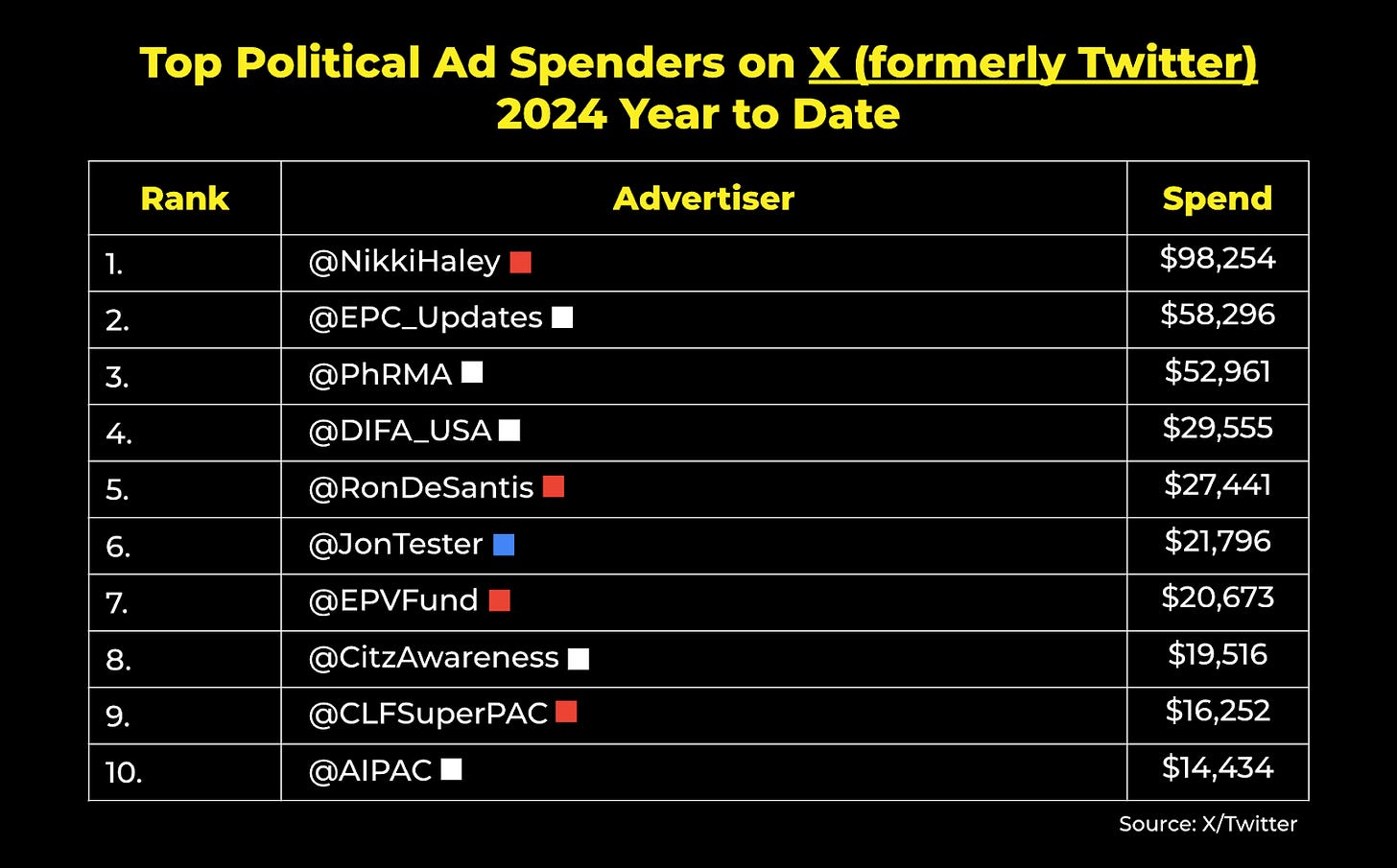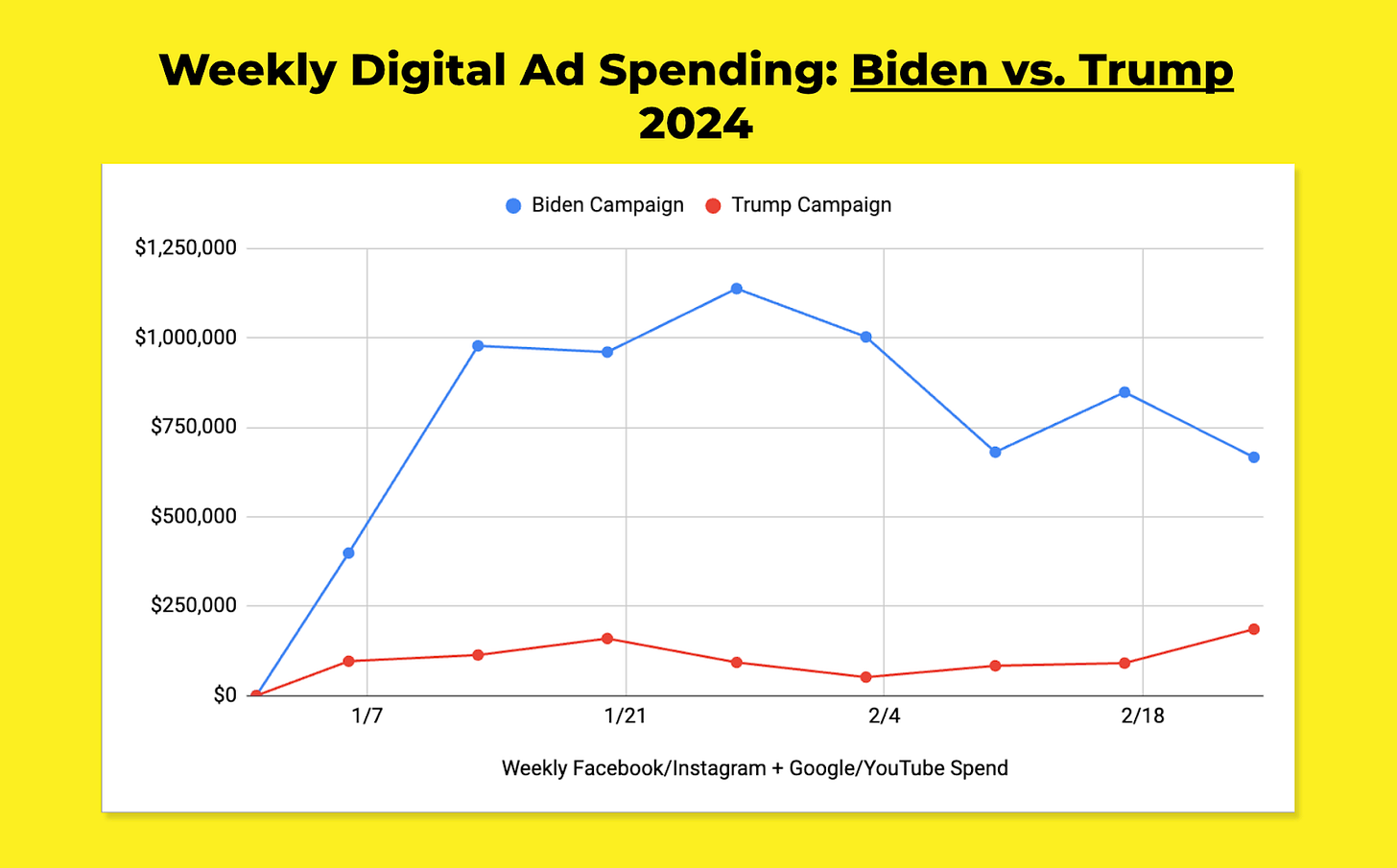Meta is already failing to enforce its new AI policy
Facebook pages spent $80,000 on ads last week using Trump's likeness, Biden’s voice to sell merch and scam seniors, in violation of Meta's new policy.
Last fall, Facebook parent company Meta announced that it would require advertisers on its platforms to disclose the use of artificial intelligence technology in political ads. The company’s new AI disclosure policy states: “Advertisers will…have to disclose when they use AI or other digital techniques to create or alter a political or social issue ad in certain cases. This applies if the ad contains a photorealistic image or video, or realistic-sounding audio, that was digitally created or altered to depict a real person as saying or doing something they did not say or do.”
That’s why this week, I was intrigued to find two pages spending tens of thousands of dollars on digitally manipulated ads imitating former President Trump’s likeness and President Biden’s voice to sell merchandise or scam seniors. The bulk of those ads, run by a MAGA merch page called American Patriot United, appear to violate Meta’s company policy on the “use of AI or other digital techniques” in political ads as they lack any required label or disclosure. As of publication, the ads remain active on the platform.
Another page, Go American Freedom, is running ads using a fake CNN segment with manipulated audio of President Biden’s voice to scam seniors into getting a $6,400 “ACA spending card.” The ads do not disclose that the voice of President Biden is fake or digitally altered.
While the political impact of these ads seems benign (they’re just scamming older conservatives out of a few bucks), this isn't the first time I have seen examples of potential Trump or Biden deepfakes being used in Facebook ads. In November, after the company’s new policy was announced but before it was stated to go into effect, FWIW identified a page spending more than $75,000 on ads manipulating the former President’s voice to say that 300 million Americans would soon die in a catastrophic event. Casual.
Then, in January, researchers in the UK found other examples of deepfake ads impersonating Prime Minister Rishi Sunak, in violation of Meta’s policy.
Like most of the election-related policy announcements the company has made over the past few years, Meta’s enforcement often fails to meet the aspirations and expectations of their stated policies. It seems like every few months, the company’s PR team is eager to blast reporters with a new blog post about what great things they are doing to safeguard our elections, while prominent violations fall through the cracks and their team has to create new loopholes and carve-outs to explain their lack of enforcement.
A clear example of this type of policy carveout was Meta’s treatment of Donald Trump’s post-January 6th, 2021 “ban” from the platform: I broke the news that his campaign was back advertising on Facebook less than 6 months later. The company scrambled in response, saying it was indeed fine for Trump’s staff to run Facebook ads from his Facebook pages, as long as they weren’t posting “in his voice.” Sure, Jan.
The next few months leading up to Election Day will be chaotic online and off, and I have very little confidence that Meta is committed to stopping the flow of misinformation on its platforms. As someone who has tracked the flow of political content on Facebook and Instagram for 5 years now, Meta’s enforcement failures are maddening but not at all surprising.
It’s wild that so many of these examples could be remedied by hiring one intern or researcher to scroll through their own Ad Library and catch policy violators before they reach millions of users or create embarrassing headlines. But that’s just not something one of the world’s richest companies has decided to prioritize, apparently.
By the numbers
FWIW, political advertisers spent just over $11.2 million on Facebook and Instagram ads last week. These were the top ten spenders nationwide:
One of the largest spenders on Facebook in Ohio last week was conservative fake news network Metric Media, via a page called “The Buckeye Reporter.” That page spent over $22,000 on ads attacking Republican U.S. Senate candidate Bernie Moreno in favor of his primary opponent, Frank LaRose. Previous reports have shown that Metric Media is a pay-for-play, articles-on-demand service for conservatives, so it is likely the company is being paid by supporters of LaRose to run these ads ahead of the March 19th primary:
Meanwhile, political campaigns spent $5.2 million on Google and YouTube ads last week. Here were the top ten spenders nationwide:
Despite things looking pretty rough for Nikki Haley’s 2024 presidential hopes right now, the Republican Accountability Project, which consists of some high-level anti-Trump Republican strategists, is still using the former UN Ambassador as a tool to hit Trump. They ran video ads of Haley bashing Trump last week, which have been mostly targeting voters in AZ, GA, MI, SC, PA, and WI.
On Snapchat, political advertisers in the U.S. have spent $290,000 on ads year to date. Here are the top spenders:
RNC Chair Ronna McDaniel may be on her way out, but she is the central focus of this kind of low-effort fundraising ad that the RNC has started running on Snapchat.
…and lastly, here are the top spending political advertisers on X (formerly Twitter) in 2024:
Your 2024 digital dispatch
FWIW, here’s how weekly digital ad spending (Facebook/Instagram, Google/YouTube) compares between the Trump and Biden campaigns year-to-date:
The Trump campaign continued to ramp up their digital spending amid reports that the Donald needs to do some serious campaign fundraising to foot his legal bills. You know what they say – you gotta spend money to make money. That said, they still spent about $500,000 less on digital ads last week than Team Biden.
From around the internet:
Threads is receiving a much larger amount of new daily app downloads than Twitter/X, according to TechCrunch
A new episode of my team’s Vibes Only podcast just dropped, featuring Brian Derrick, Glennis Meagher, and Instagram creator Emily Amick breaking down Republicans’ faceplant on IVF. Listen here »
There are more older people (see: Millenials) on TikTok than you might have thought. Ryan Broderick explains Pew’s new data in Garbage Day >>
Does the candidate who generates the most clicks win? That’s the question asked by Mark Jacob in his Stop the Presses newsletter this week.
One more thing: The CPAC freakshow
Last weekend, conservatives and actual Nazis gathered outside of Washington, DC for the Conservative Political Action Conference (CPAC). The most viral moment from the festivities came when leading Trump surrogate Jack Posobiec proclaimed their intent to “overthrow Democracy” once and for all. Watch the clip below:
Veteran progressive journalist Nina Burleigh had an excellent and entertaining write-up of the conference’s absurdities in her American Freakshow newsletter on Tuesday. You can read + subscribe here>>
That’s it for FWIW this week! This email was sent to 19,331 readers. If you enjoy reading FWIW and want to help us reach our Q1 goal of 20,000 readers, consider forwarding this email to a colleague or share it on Twitter & Threads!











